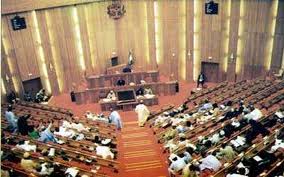After a lot of foot-dragging and several entreaties by President Goodluck Jonathan, the Senate on Thursday finally passed the anti-terrorism bill into law.
Coming barely 24 hours after Jonathan wrote the lawmakers passionately pleading for its passage, the new law seeks to combat terrorism in all its ramifications.
The president on Wednesday again wrote to the leadership of the National Assembly soliciting the quick passage of the Money Laundering Prohibition Bill and the Anti-Terrorism Bill.
It was the third time in four months that the President would be appealing to the lawmakers' sense of urgency in passing the crucial bill that have been in the legislative works since 2009. He had earlier written two letters to the National Assembly on the issue in June and August last year.
The passage of the bill followed the adoption of the report of the Senate Committee on National Security and Intelligence that has been saddled with the task of fine-tuning the bill since it passed second reading last year.

Presenting the committee's report, its Chairman, Senator Nuhu Aliyu (PDP, Kano) explained that the fight against terrorism has today become a global fight and Nigeria as a member of the international community seeks to play an important role.

He noted that with the event of September 11, 2001 in the US, various countries the world over have put measures in place to check the activities of terrorists, especially with the passage of the UN Security Council resolution 1373.
He said, "For those of us who were here during the fifth senate, you will recall that a bill to combat terrorist acts was read on this chamber in 2005 but it could not scale the second reading because it was the thinking of the Senate then, that the objective conditions for having an Anti-Terrorist Act were not extant in Nigeria".
Aliyu explained that the bill seeks to provide a legal framework for the prevention, prohibition and combating of acts terrorism in Nigeria as well as prescribe penalties for violating any of its provisions.
Under the new bill, many organized crimes such as oil bunkering, hostage taking and kidnappings will attract stiff penalties.
Aliyu maintained that when it becomes operational, the bill "will go a long way to lay the legal framework for measures for the prevention, prohibition and combating of acts of terrorism, the financing of terrorism in Nigeria and for the effective implementation of the Convention on the prevention and combating of terrorism and the convention on the suppression of the financing of terrorism.
It also seeks to prescribe penalties for violating any of its provisions."
Section 2(c) of the bill defines 'act of terrorism" as causing an attack upon a person's life which may cause serious bodily harm or death; kidnapping of a person; destruction to a government or public facility, transport system, an infrastructural facility including an information system, a fixed platform located on the continental shelf, public place or private property likely to endanger human life or result in major economic loss.
"The seizure of an aircraft, ship or other means of public or goods transport and the use of such means of transportation for any of the purposes..."
The bill also stipulates that a person who belongs or professes to belong to a proscribed organization has committed an offence and shall on conviction be liable to imprisonment for a maximum term of 20 years.
The bill however clarifies that "political parties should not be regarded as proscribed organizations and nobody should be treated as such because of his/her political beliefs."
This is a good development what do you think post your comments below.
Coming barely 24 hours after Jonathan wrote the lawmakers passionately pleading for its passage, the new law seeks to combat terrorism in all its ramifications.
The president on Wednesday again wrote to the leadership of the National Assembly soliciting the quick passage of the Money Laundering Prohibition Bill and the Anti-Terrorism Bill.
It was the third time in four months that the President would be appealing to the lawmakers' sense of urgency in passing the crucial bill that have been in the legislative works since 2009. He had earlier written two letters to the National Assembly on the issue in June and August last year.
The passage of the bill followed the adoption of the report of the Senate Committee on National Security and Intelligence that has been saddled with the task of fine-tuning the bill since it passed second reading last year.

Presenting the committee's report, its Chairman, Senator Nuhu Aliyu (PDP, Kano) explained that the fight against terrorism has today become a global fight and Nigeria as a member of the international community seeks to play an important role.

President Goodluck Jonathan
He said, "For those of us who were here during the fifth senate, you will recall that a bill to combat terrorist acts was read on this chamber in 2005 but it could not scale the second reading because it was the thinking of the Senate then, that the objective conditions for having an Anti-Terrorist Act were not extant in Nigeria".
Aliyu explained that the bill seeks to provide a legal framework for the prevention, prohibition and combating of acts terrorism in Nigeria as well as prescribe penalties for violating any of its provisions.
Under the new bill, many organized crimes such as oil bunkering, hostage taking and kidnappings will attract stiff penalties.
Aliyu maintained that when it becomes operational, the bill "will go a long way to lay the legal framework for measures for the prevention, prohibition and combating of acts of terrorism, the financing of terrorism in Nigeria and for the effective implementation of the Convention on the prevention and combating of terrorism and the convention on the suppression of the financing of terrorism.
It also seeks to prescribe penalties for violating any of its provisions."
Section 2(c) of the bill defines 'act of terrorism" as causing an attack upon a person's life which may cause serious bodily harm or death; kidnapping of a person; destruction to a government or public facility, transport system, an infrastructural facility including an information system, a fixed platform located on the continental shelf, public place or private property likely to endanger human life or result in major economic loss.
 |
| Senate President David Mark |
"The seizure of an aircraft, ship or other means of public or goods transport and the use of such means of transportation for any of the purposes..."
The bill also stipulates that a person who belongs or professes to belong to a proscribed organization has committed an offence and shall on conviction be liable to imprisonment for a maximum term of 20 years.
The bill however clarifies that "political parties should not be regarded as proscribed organizations and nobody should be treated as such because of his/her political beliefs."
This is a good development what do you think post your comments below.











